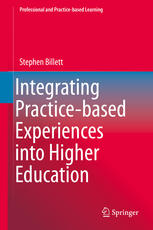

Most ebook files are in PDF format, so you can easily read them using various software such as Foxit Reader or directly on the Google Chrome browser.
Some ebook files are released by publishers in other formats such as .awz, .mobi, .epub, .fb2, etc. You may need to install specific software to read these formats on mobile/PC, such as Calibre.
Please read the tutorial at this link: https://ebookbell.com/faq
We offer FREE conversion to the popular formats you request; however, this may take some time. Therefore, right after payment, please email us, and we will try to provide the service as quickly as possible.
For some exceptional file formats or broken links (if any), please refrain from opening any disputes. Instead, email us first, and we will try to assist within a maximum of 6 hours.
EbookBell Team

4.8
44 reviewsThis book advances understandings about and practices for effectively integrating practice-based (e.g. workplace) experiences in higher education programs. This issue is becoming of increasing salient because higher education programs globally are increasingly focussing on preparing students for specific occupations. Such imperatives are reflected in the cooperative education movement in North America, the foundation degree programs of the United Kingdom, the work integrated learning approach within Australian higher education and initiatives in a range of other countries. There are clear and growing expectations that graduates from such should be able to move smoothly into being effective in their occupational practice. These expectations rise from the imperatives and interest of government, employers, community and students themselves. The book achieves a number of important goals. Firstly, it identifies and delineates the educational worth of students and engagement in practice-based experiences and their integration within their programs of study. Secondly, it advances conceptions of the integration of such experiences that is essential to inform how these programs might be enacted. Thirdly, drawing on the findings of two teaching fellowships, it proposed bases and propositions for how experiences in higher education programs might be organised and augmented to support effective learning. Fourthly pedagogic practices seen to be effective in maximising the learning from those practice experiences and integrating them within the curriculum are identified and discussed. Fifthly, a particular focus is given to students’ personal epistemologies and how these might be developed and directed towards supporting effective learning within practice settings and the integration of that learning in their university programs.